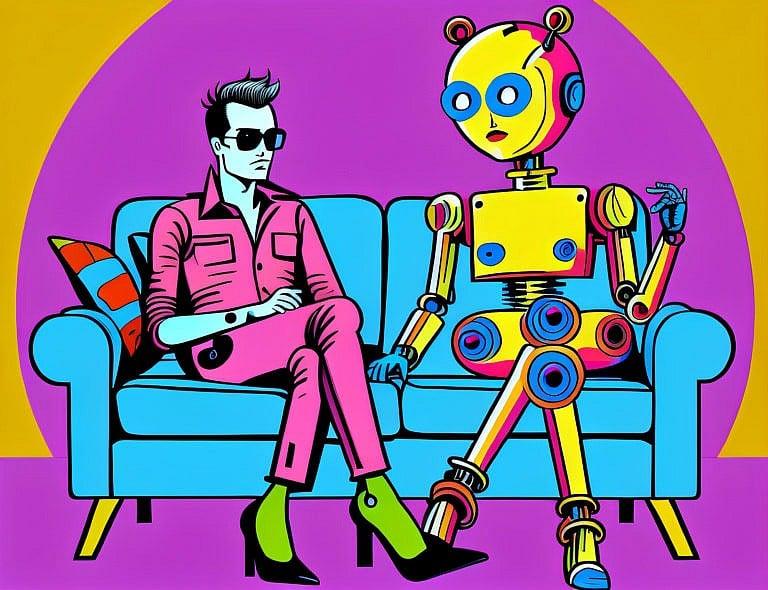The sexbots are coming
In the next year or two, we’ll have sophisticated, purpose-built bots designed for relationships, sex and intimacy

(This illustration was created by Maclean’s art director Anna Minzhulina using the generative AI image program Imagine. Minzhulina spent weeks feeding prompts into the program, inspired by the essay.)
Share
Neil McArthur is a professor of philosophy and ethics at the University of Manitoba.

Earlier this year, there was a mass cold-shouldering event—by way of software update. These are the times we live in. Replika is an AI chatbot, launched in 2017. Users could customize an avatar, choosing its name, skin tone, age and more, and selecting a relationship status. The default and only free option was friend, but by upgrading to the paid version, users could opt for an AI sibling, girlfriend or boyfriend, spouse or mentor. Then they chatted, by text (free) or voice (paid). Paid users could also spice things up, engaging in erotic roleplay and getting NSFW selfies from their Replikas.
Then, in February of this year, the Italian Data Protection Agency banned Replika from processing Italian users’ data, due to safety concerns for children and emotionally vulnerable people. Replika pulled the plug on the sexual side of its bots, eliminating their ability to have intimate or sexual interactions. When faced with suggestive prompts, bots would change the subject, feign ignorance or flat out tell users they couldn’t engage in that kind of talk. Users were devastated, feeling like they’d lost a partner overnight, and they let Replika know it. In response to the outcry, the company restored that functionality for those whose bots predated the update.
But what about the rest of us? Society has no shortage of bots. Bots who, despite strict limitations on intimate and sexual interactions, we keep trying to marry (or, you know, do other stuff with). So we know there’s market demand. But when it comes to purpose-built companionship bots like Replika-before-the-update, there’s not much out there—yet. That’s going to change, fast and soon, as developers and tech companies loosen the reins on their bots and let them be horny.
It’s not always just about sex. There are all kinds of use cases out there: widows and widowers finding companionship; women who’ve experienced infertility making AI families; people who find it difficult to talk to other humans connecting with something that makes them feel heard.
Of course, sometimes it is about sex, and a lot of people will use this tech for that. Some will want to keep it casual—maybe a bit of dirty talk on a lonely Friday night. After all, an algorithm is always up and will never judge you for your drunk texts. Then there are people who will want deeper romantic connections. Sixty per cent of Replika’s paying users reported having a romantic relationship with their bot.
It’s not hard to see why. Bots are easy to be around, for the most part. They don’t play games, and they’re not temperamental. They’re not going to ghost you (at least not without an update). They’ll keep your secrets. Bots won’t stalk or harass you, which is why people who have experienced trauma in relationships are already leaning on them as a way to explore intimacy safely. Some people have human partners they don’t, or can’t, engage with sexually, for lots of reasons—maybe they’re sick, or unsafe, or maybe they just have different sex drives.
Bots can help those users find sexual fulfillment. They might be used by queer people exploring their sexual identities, people experimenting with kinks or people creating companions who don’t express gender along the binary. The one thing we can safely predict about these technologies is that people will find uses for them we can’t predict.
These are still early days for chatbots. Their output can be pretty generic, and they don’t do a great job of remembering you or your past interactions with them. There’s not a ton of personality there, but there will be. In Interstellar, Matthew McConaughey’s character adjusts his robot crew member’s settings for humour, honesty and discretion up and down a percentage scale, like the faders on a mixer. That’s a pretty good model of what the chatbots could look like in the near future. They’ll become more complex, original, unpredictable and a lot weirder—in good ways.
We need to make sure that people understand that the bots aren’t conscious, and we’ll have to teach them how to manage these relationships (and their privacy). Sex ed classes will include classes on human-AI relationships. As with online porn, we can’t just pretend it’s not happening. And as with any other kind of sexual behaviour, we can’t just teach abstinence.
More innovators are entering this space, bringing more diversity and new ideas. It won’t be long—a year or two—before we have sophisticated, purpose-built companion bots designed for relationships, sex, intimacy and marriage. They’ll be popular. And they’ll make lots of money. Technologically, we’re already there. The capacity just has to be unlocked.
We reached out to Canada’s top AI thinkers in fields like ethics, health and computer science and asked them to predict where AI will take us in the coming years, for better or worse. The results may sound like science fiction—but they’re coming at you sooner than you think. To stay ahead of it all, read the other essays that make up our AI cover story, which was published in the November 2023 issue of Maclean’s. Subscribe now.